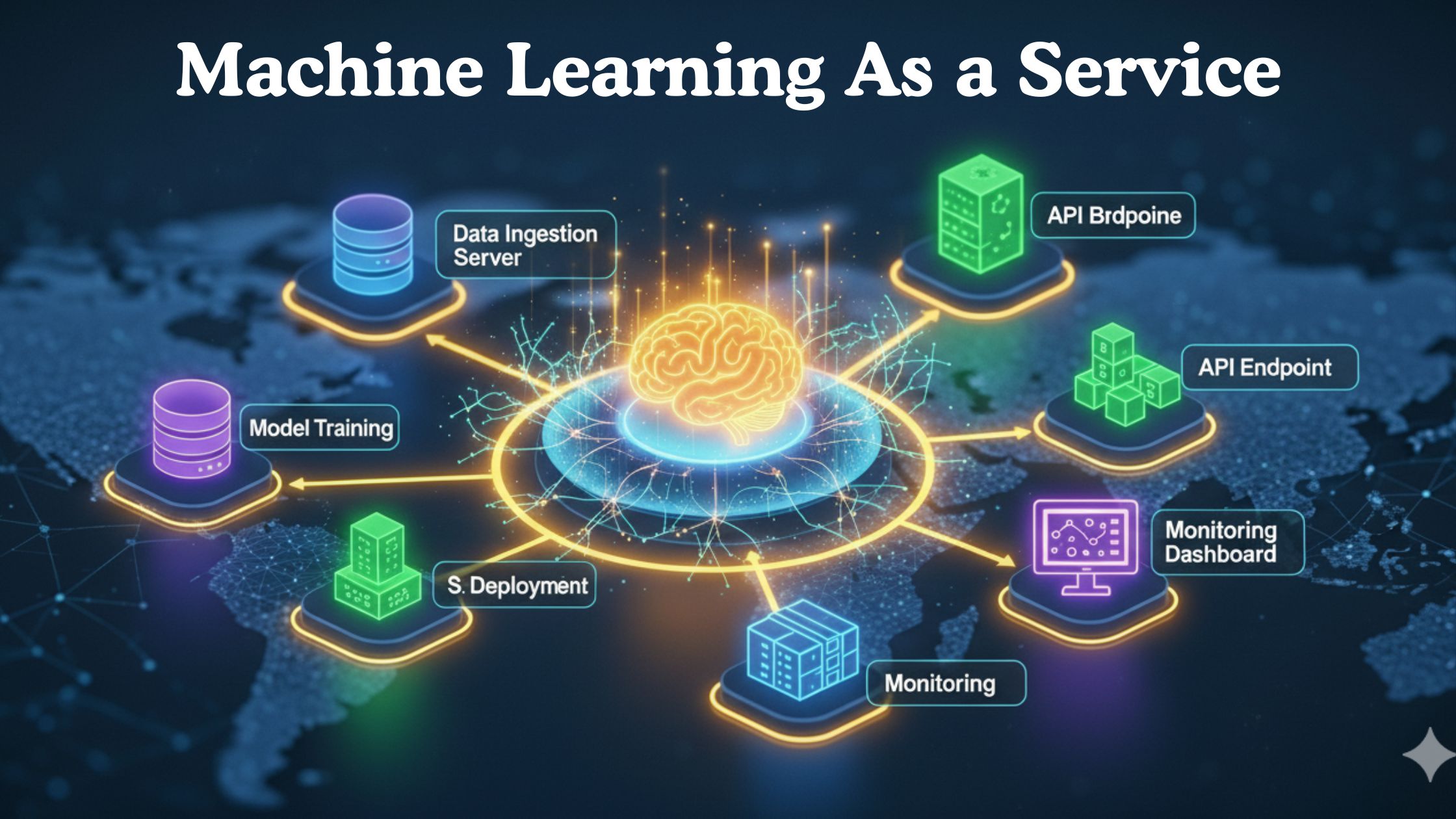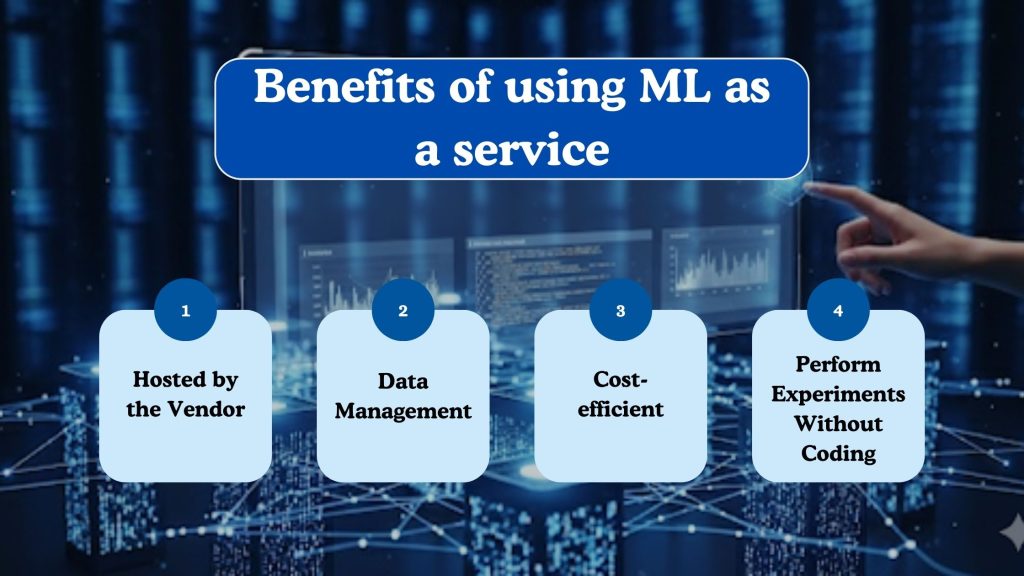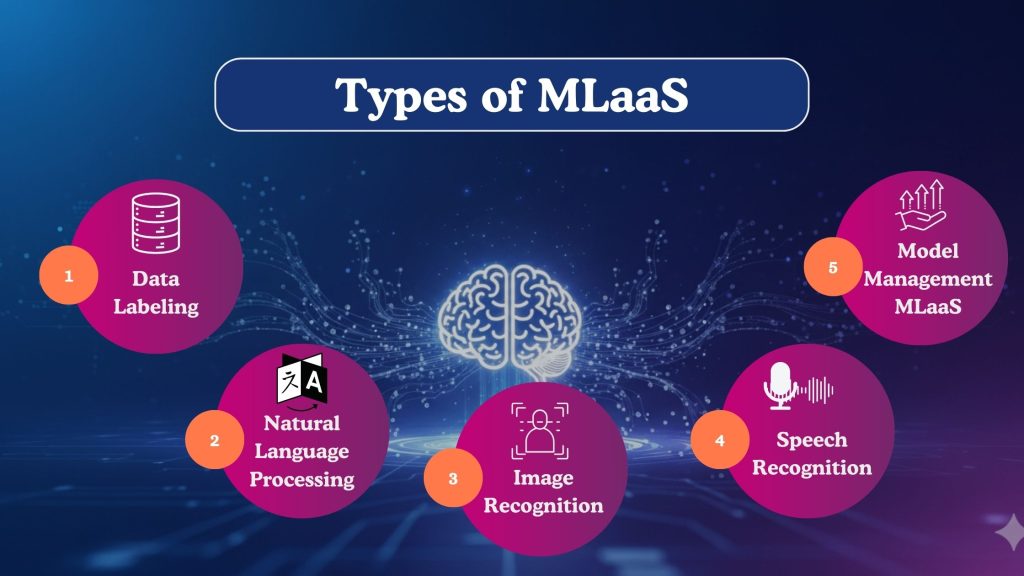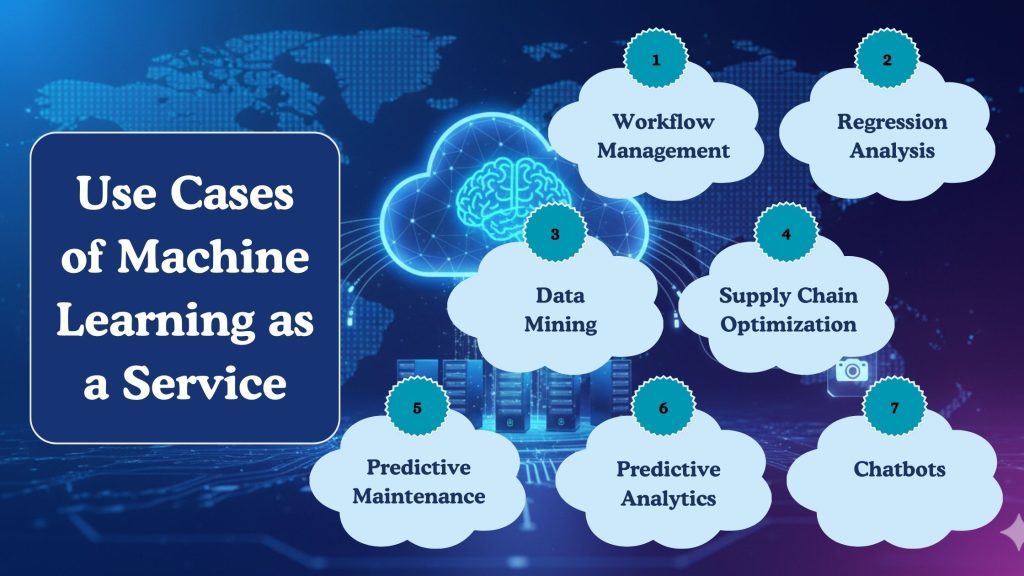
Machine Learning as a Service: What is It and How It Works?

Blog Summary:
In this blog, we’ll explore everything you need to know about Machine Learning as a Service (MLaaS)—from what it is, how it works, and the benefits it offers to businesses of all sizes. We’ll also examine the types of MLaaS, real-world use cases across various industries, and why it’s becoming a popular choice for companies seeking to scale with data-driven insights. Finally, we’ll discuss how partnering with the right service provider can accelerate your ML journey.
In today’s digital-first world, organizations generate and collect more data than ever before. The challenge, however, lies in transforming this raw information into actionable insights. This is where Machine Learning as a Service (MLaaS) comes into play.
Instead of building expensive in-house infrastructure, businesses can access powerful machine learning models, tools, and frameworks directly through the cloud.
With ML as a service, companies can streamline complex processes, such as predictive analytics, data mining, and workflow automation, without requiring deep technical expertise.
From startups exploring proof-of-concept models to enterprises optimizing their supply chains, cloud-based machine learning platforms are making advanced analytics accessible and scalable.
At BigDataCentric, we’ve already seen the potential of integrating artificial intelligence services, machine learning development services, and business intelligence solutions into business operations, helping organizations leverage the full value of their data.
This growing reliance on managed solutions is a strong indicator of how MLaaS is set to shape the future of intelligent decision-making.
What Is Machine Learning as a Service (MLaaS)?
Machine Learning As a Service (MLaaS) refers to a range of cloud-based services that provide ready-to-use machine learning tools, models, and infrastructure. Instead of building algorithms, setting up servers, or hiring large data science teams, organizations can rely on vendors that host these services on the cloud.
This enables businesses of any size to integrate advanced analytics and automation into their workflows without needing to start from scratch.
At its core, MLaaS is similar to other cloud offerings, such as SaaS (Software as a Service) or PaaS (Platform as a Service). Companies subscribe to these services and pay for what they use, gaining access to pre-trained models, drag-and-drop interfaces, and scalable storage for managing large datasets.
For example, tasks such as data labeling, predictive modeling, or speech recognition can be achieved with just a few configurations.
Another strength of MLaaS lies in its flexibility. Whether a company wants to run a simple regression analysis, test natural language processing applications, or build a chatbot, MLaaS offers a library of tools to experiment with.
For businesses already adopting data science or artificial intelligence services, these platforms serve as an extension of their existing ecosystem, enabling them to innovate faster without incurring additional operational overhead.
By lowering the entry barrier, cloud-based machine learning platforms are democratizing the adoption of machine learning. Enterprises that once hesitated to explore AI-driven solutions now find it feasible and cost-effective to get started through MLaaS.
Empower Your Business with Machine Learning As a Service
Adopt MLaaS to enhance efficiency, predict trends, and stay ahead with scalable machine learning services.
How Does MLaaS Actually Work?
The working of Machine Learning as a Service can be understood as a streamlined process that moves data from raw input to actionable insights through vendor-managed cloud infrastructure. Instead of managing multiple components in-house, companies rely on the service provider to handle the heavy lifting.
Here’s a simplified breakdown of how it works:
Data Collection and Storage
Businesses upload their datasets—structured or unstructured—onto the cloud environment provided by the MLaaS vendor. This can include sales data, customer interactions, sensor data, or even images and audio files. Vendors typically offer secure and scalable storage solutions for this purpose.
Data Preprocessing
Raw data often contains errors, duplicates, or missing values. The MLaaS platform helps clean, normalize, and prepare this data so it’s ready for training machine learning models. Many platforms also support automated preprocessing, reducing the need for manual intervention.
Model Selection and Training
Once the data is ready, businesses can either use pre-trained models or train custom ones. Vendors provide libraries and frameworks that make this step accessible, even to teams with limited coding skills. This stage covers selecting algorithms, adjusting parameters, and testing performance.
Deployment and Integration
After training, the model is deployed into production. Thanks to MLaaS, integration into existing systems—such as customer support tools, supply chain dashboards, or marketing analytics platforms—becomes significantly faster. The cloud setup ensures scalability, allowing the model to handle increasing workloads as the business expands.
Continuous Monitoring and Optimization
Machine learning models must evolve as new data streams in. MLaaS providers offer monitoring dashboards, automated retraining options, and performance metrics to ensure models remain accurate and relevant.
In short, MLaaS simplifies the process of building machine learning pipelines by consolidating data management, infrastructure, and ready-to-use algorithms into a single platform. This allows organizations to focus on using insights rather than worrying about the technical backend.
Benefits of using ML as a service

Adopting Machine Learning as a Service offers organizations several tangible advantages. By adopting a cloud-first approach, businesses can reduce infrastructure costs, enhance efficiency, and accelerate innovation with minimal technical requirements.
Hosted by the Vendor
One of the biggest benefits of MLaaS is that the service is entirely managed and hosted by the vendor. Businesses don’t need to set up costly hardware or manage complex frameworks on their own. This makes machine learning services accessible to startups and enterprises alike, ensuring scalability as their data and use cases grow.
Data Management
Managing large volumes of data is often a challenge for organizations. With MLaaS, vendors provide built-in tools for data cleaning, storage, and analysis, making it easier to prepare information for model training.
This seamless integration ensures companies can quickly transform raw datasets into structured insights, much like what’s achieved through data science services.
Cost-efficient
Instead of investing in expensive infrastructure and hiring full-time data scientists, MLaaS allows businesses to pay only for what they use. This subscription-based model minimizes upfront costs, making advanced analytics feasible even for companies with limited budgets.
Perform Experiments Without Coding
MLaaS platforms often come with drag-and-drop interfaces and pre-built models, allowing non-technical users to run experiments easily. This democratizes innovation, as teams can test predictive analytics, natural language processing, or image recognition workflows without needing to write a single line of code.
In essence, MLaaS not only makes cloud based machine learning platforms affordable but also empowers businesses to stay competitive in fast-evolving markets.
Looking to Innovate Faster with Machine Learning As a Service?
Use MLaaS to build scalable solutions, enhance predictions, and stay ahead of competitors.
Types of MLaaS

Machine Learning As a Service isn’t a one-size-fits-all solution. Different businesses have varied needs, so MLaaS platforms offer a wide range of specialized services.
Here are some of the most common types:
Data Labeling
Data labeling is essential for supervised learning models. It involves tagging datasets—such as categorizing emails as spam or not spam, or labeling images with the objects they contain. MLaaS providers simplify this process by offering automated labeling tools, which reduce human effort while maintaining accuracy.
Natural Language Processing
Natural language processing (NLP) enables machines to understand, analyze, and respond to human language. Through MLaaS, businesses can integrate NLP into customer support systems, sentiment analysis tools, or content moderation platforms. This type of service is particularly valuable in industries where customer interaction data is a key driver. Many organizations also pair NLP with chatbot development services to deliver personalized user experiences.
Image Recognition
From healthcare diagnostics to retail inventory tracking, image recognition has widespread applications. MLaaS platforms provide pre-trained models that can identify patterns, detect anomalies, and classify images with high precision, saving businesses the time and cost of developing such systems from scratch.
Speech Recognition
Speech recognition services convert spoken language into text or commands, enabling voice-driven applications. Businesses use this for virtual assistants, transcription services, and even hands-free interfaces in industrial settings. MLaaS platforms often combine speech recognition with NLP to offer end-to-end voice solutions.
Model Management MLaaS
Managing machine learning models over time is a challenge, especially as data evolves. Model management tools within MLaaS platforms enable the tracking of versions, retraining of models when needed, and monitoring of their performance. This ensures that predictions remain accurate and relevant in changing environments.
By offering specialized capabilities such as data labeling, NLP, image recognition, and speech recognition, MLaaS providers enable businesses to select the services that best match their needs without reinventing the wheel.
Top Use Cases of Machine Learning as a Service (MLaaS)

The versatility of Machine Learning as a Service makes it valuable across industries. From predictive analytics to workflow automation, MLaaS empowers businesses to solve complex challenges with minimal setup.
Below are some of the most impactful use cases:
Workflow Management
MLaaS can optimize workflows by automating repetitive tasks, detecting inefficiencies, and suggesting improvements. Businesses can design smart workflows that adjust based on real-time data, reducing bottlenecks and increasing productivity.
This is particularly beneficial for organizations that already rely on business intelligence services to make data-driven decisions.
Regression Analysis
Regression analysis is a foundational technique in machine learning. Through MLaaS, businesses can apply regression models to identify trends, forecast future outcomes, and measure relationships between variables.
For example, financial institutions use regression analysis to predict loan default risks or evaluate stock price movements.
Data mining
With MLaaS platforms, data mining becomes more efficient. These services enable businesses to uncover hidden patterns, correlations, and anomalies within large datasets. Retailers, for instance, utilize data mining to understand customer purchasing habits, while healthcare providers analyze patient data to enhance treatment outcomes.
Supply chain optimization
Supply chains generate massive amounts of data, from inventory tracking to logistics. MLaaS enables predictive insights into demand forecasting, route optimization, and supplier risk assessment. This results in cost savings, faster delivery times, and more effective resource allocation.
Predictive maintenance
For industries that rely on machinery and equipment, predictive maintenance is a game-changer. MLaaS models analyze sensor data to detect anomalies, predict potential breakdowns, and recommend timely maintenance. This reduces downtime and extends equipment lifespan.
Predictive analytics
Predictive analytics uses historical data to forecast future outcomes. MLaaS platforms provide scalable tools to run such models across various domains—such as customer churn analysis in telecom, fraud detection in banking, or campaign success predictions in marketing.
Companies that leverage finance data science and analytics often integrate predictive analytics into their core strategies to gain a competitive advantage.
Chatbots
Chatbots powered by MLaaS combine natural language processing and machine learning to deliver human-like conversations. Businesses deploy them for customer support, sales inquiries, and even internal employee assistance.
Since MLaaS handles the training and updates, chatbots continuously improve over time, offering smarter responses and enhancing customer satisfaction.
By covering such diverse applications, MLaaS proves its value as a flexible and scalable solution for modern enterprises.
Why Partner with BigDataCentric for Your MLaaS Journey?
Choosing the right partner for your Machine Learning as a Service journey is just as important as selecting the right platform.
At BigDataCentric, we combine deep expertise in data science, artificial intelligence services, machine learning development services, and business intelligence solutions, enabling businesses to unlock the full value of MLaaS.
Here’s why organizations trust us:
- End-to-end expertise – From data collection and preparation to model training, deployment, and monitoring, our team provides complete support at every stage of the MLaaS lifecycle.
- Tailored Solutions – We understand that every business is unique. That’s why we customize MLaaS implementations to match your specific industry challenges, whether it’s predictive maintenance in manufacturing, customer insights in retail, or fraud detection in finance.
- Seamless Integration – Our solutions integrate smoothly with your existing systems and workflows, ensuring minimal disruption while adding maximum value.
- Focus on Innovation – We don’t just implement tools—we empower businesses to experiment with new ideas, whether it’s building smart chatbots, deploying advanced NLP, or leveraging predictive analytics for growth.
- Scalable and Future-ready – As your business expands, our MLaaS solutions grow with you. With expertise in cloud based machine learning platforms, we help ensure that your infrastructure can handle increasing data volumes and evolving requirements.
By partnering with BigDataCentric, companies can confidently adopt MLaaS and stay ahead in a competitive landscape—turning raw data into actionable intelligence at scale.
Want Future-ready Solutions with Machine Learning As a Service?
Stay competitive with MLaaS platforms that scale as your business grows.
Conclusion
Machine Learning as a Service is transforming how businesses approach data-driven decision-making. By offering ready-to-use models, scalable infrastructure, and simplified deployment, MLaaS removes the barriers that once limited the adoption of advanced analytics.
From workflow management and predictive maintenance to chatbots and supply chain optimization, its applications span across industries, making it a powerful tool for growth.
For organizations, the real advantage lies in accessibility—leveraging machine learning services without the need for massive investments in infrastructure or technical expertise.
As businesses continue to generate more data, MLaaS offers the flexibility and efficiency necessary to remain competitive in rapidly evolving markets.
At BigDataCentric, we combine our expertise in data science, business intelligence, and machine learning development services to deliver tailored MLaaS solutions.
Whether you’re just starting your ML journey or looking to scale existing initiatives, our cloud-based machine learning platforms and specialized services ensure that your business can unlock actionable insights with confidence.
FAQs
-
Is Netflix a machine learning?
Netflix is not machine learning itself, but it uses machine learning extensively for personalized recommendations, content optimization, and user experience improvements.
-
What is ML is SaaS?
ML in SaaS refers to embedding machine learning capabilities within Software-as-a-Service applications, enabling smarter features like automation, predictions, and personalization.
-
What are the main benefits of using MLaaS?
MLaaS offers cost savings, faster deployment, scalability, and accessibility, allowing businesses to use advanced ML tools without building in-house infrastructure.
-
What are the four types of machine learning?
The four main types are Supervised Learning, Unsupervised Learning, Semi-Supervised Learning, and Reinforcement Learning.
-
Are there limitations to using MLaaS compared to in-house ML?
Yes, limitations include reduced customization, dependency on cloud providers, potential security concerns, and less control over model transparency.

About Author
Jayanti Katariya is the CEO of BigDataCentric, a leading provider of AI, machine learning, data science, and business intelligence solutions. With 18+ years of industry experience, he has been at the forefront of helping businesses unlock growth through data-driven insights. Passionate about developing creative technology solutions from a young age, he pursued an engineering degree to further this interest. Under his leadership, BigDataCentric delivers tailored AI and analytics solutions to optimize business processes. His expertise drives innovation in data science, enabling organizations to make smarter, data-backed decisions.
Table of Contents
ToggleHere's what you will get after submitting your project details:
- A strict non-disclosure policy.
- Get in discuss with our experts.
- Get a free consultation.
- Turn your idea into an exceptional app.
- Suggestions on revenue models & planning.
- No obligation proposal.
- Action plan to start your project.
- We respond to you within 8 hours.
- Detailed articulate email updates within 24 hours.
Our Offices
USA
500 N Michigan Avenue, #600,Chicago IL 60611




